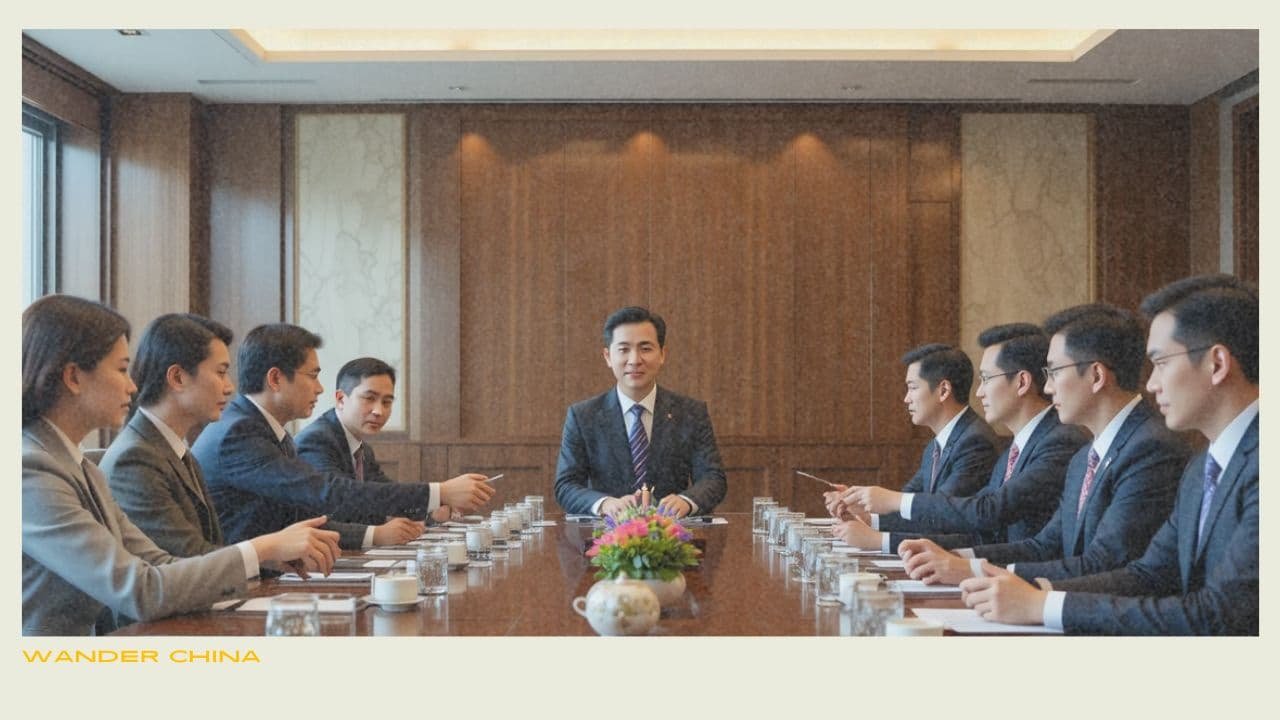How to Thrive in Chinese Corporate Culture as a Foreigner
Explore Chinese business culture: guanxi, etiquette, communication, meetings, and hierarchy.

What Is Chinese Business Culture?
Chinese business culture refers to the values, traditions, and practices that shape the way business is conducted in China. It is deeply rooted in the country’s rich history and philosophical teachings, such as Confucianism, Taoism, and Buddhism. Understanding Chinese business culture is crucial for anyone seeking to establish successful business relationships and navigate the complexities of the Chinese market.
The origins of Chinese business culture can be traced back thousands of years, with influential philosophies like Confucianism playing a significant role in shaping the principles and customs that govern business interactions. Confucian values such as harmony, hierarchy, and respect for elders and authority figures have profoundly influenced the way Chinese businesses operate and how relationships are built and maintained.
In modern China, business culture remains an integral part of the country’s economic landscape. As China continues to emerge as a global economic powerhouse, its unique business practices and cultural nuances have become increasingly relevant for companies and individuals seeking to engage with the Chinese market. Failure to understand and adapt to Chinese business culture can lead to misunderstandings, strained relationships, and missed opportunities.
Guanxi: The Foundation of Chinese Business Relationships
Guanxi (关系) is a fundamental concept in Chinese business culture that refers to the system of personal connections, relationships, and networks. It is deeply rooted in the Confucian values of reciprocity, loyalty, and mutual obligation. In the Chinese business world, guanxi is not just a casual acquaintance but a complex web of social and professional ties that can greatly influence business decisions and outcomes.
The meaning of guanxi extends beyond simple networking or making contacts. It involves cultivating and maintaining long-term, mutually beneficial relationships based on trust, respect, and the exchange of favors. Guanxi is not a one-time transaction but a continuous process of building and nurturing connections over time.
Importance of Guanxi in Chinese Business:
- Access and Opportunities: Guanxi can open doors to valuable business opportunities, introductions, and inside information that may not be readily available through formal channels. Strong guanxi networks can provide access to decision-makers, potential partners, and key stakeholders.
- Trust and Credibility: In China, personal relationships often take precedence over formal contracts or legal agreements. Guanxi helps establish trust and credibility between business partners, which is essential for successful collaborations and negotiations.
- Smoother Operations: Having good guanxi with government officials, regulators, and industry players can facilitate smoother operations, faster approvals, and more favorable treatment. It can help navigate bureaucratic processes and overcome potential obstacles.
Building and Maintaining Guanxi:
- Personal Interactions: Guanxi is built through face-to-face interactions, shared experiences, and personal connections. Attending social events, sharing meals, and engaging in small talk are essential for establishing and strengthening guanxi ties.
- Reciprocity: Guanxi is based on the principle of mutual benefit and reciprocity. It involves the exchange of favors, gifts, or assistance, with the expectation that the gesture will be returned in the future when needed.
- Patience and Consistency: Developing strong guanxi takes time, patience, and consistent effort. It requires regularly nurturing relationships through frequent communication, sharing information, and demonstrating reliability and trustworthiness.
- Respect and Face: Showing respect for hierarchy, age, and social status is crucial in guanxi relationships. Avoiding actions that could cause someone to “lose face” (lose respect or dignity) is essential for maintaining harmonious guanxi ties.
While guanxi can be a powerful tool in Chinese business, it is important to navigate it ethically and within legal boundaries. Building genuine, mutually beneficial relationships based on trust and respect is the key to leveraging the power of guanxi in Chinese business culture.
Hierarchy and Respect in Chinese Business
Hierarchy plays a crucial role in Chinese business culture, and showing respect to superiors is considered essential. In Chinese companies, there is a clear chain of command, and decisions typically flow from the top down. Employees are expected to defer to their superiors and follow instructions without questioning authority.
The use of honorifics, or titles that denote rank and status, is widespread in Chinese business settings. Addressing someone by their proper title, such as “Manager Zhang” or “Director Li,” is a sign of respect and acknowledges their position within the company hierarchy.
Seniority is also highly valued in Chinese business culture. Older employees or those with more experience are accorded greater respect and deference, regardless of their official position within the company. This reverence for age and experience stems from traditional Confucian values that emphasize filial piety and respect for elders.
In meetings or discussions, it is common for the most senior or highest-ranking person present to speak first and for others to listen attentively without interrupting. Disagreeing openly with a superior or challenging their decisions is generally frowned upon, as it can be seen as disrespectful and a loss of face.
Building relationships and earning trust over time is essential for gaining respect in Chinese business culture. Newcomers or foreigners may initially be viewed with skepticism or treated with less deference until they have proven their worth and established their position within the hierarchy.
Face and Avoiding Embarrassment
In Chinese business culture, the concept of “face” (miànzi) is of paramount importance. Face represents one’s dignity, respect, and social standing within their community or professional circle. Losing face, or being embarrassed or disrespected in front of others, is considered a significant blow to one’s reputation and can have far-reaching consequences.
Maintaining face is a constant consideration in Chinese business interactions. Disagreements or criticisms, even constructive ones, should be handled with utmost care and discretion to avoid causing the other party to lose face. Direct confrontation or public humiliation is strongly frowned upon, as it can irreparably damage relationships and trust.
Instead, Chinese businesspeople often employ indirect communication strategies to address issues or concerns. Subtle hints, metaphors, or third-party intermediaries may be used to convey messages without directly challenging or embarrassing the other party. This approach allows for saving face while still addressing the matter at hand.
Giving face, or actively helping others maintain their dignity and respect, is also a crucial aspect of Chinese business culture. This can involve public praise, offering compliments, or deferring to the opinions and suggestions of those in higher positions or with more experience. By giving face, you demonstrate your respect and strengthen your professional relationships.
Foreigners conducting business in China should be mindful of the importance of face and take great care to avoid causing embarrassment or loss of face, whether intentional or not. Maintaining a respectful and tactful demeanor, particularly in public settings or when dealing with hierarchical structures, can go a long way in building trust and fostering successful business relationships.
Indirect Communication and Saving Face
In Chinese business culture, indirect communication is highly valued as a means of preserving harmony and avoiding confrontation or loss of face. Direct criticism or confrontation is often seen as rude and disruptive to relationships.
Instead of being explicit, the Chinese communication style tends to be more implicit, with suggestions conveyed through hints, metaphors, or subtle body language. Directness is viewed as insensitive and can potentially damage business relationships built on trust and respect.
This indirect approach extends to delivering bad news or providing negative feedback. Rather than stating issues bluntly, the Chinese may use vague language or euphemisms to soften the blow. It’s essential to read between the lines and interpret the underlying message carefully.
Saving face, or preserving one’s dignity and reputation, is a crucial aspect of Chinese business culture. Causing someone to lose face, whether intentionally or unintentionally, can severely damage relationships and future business prospects.
To avoid loss of face, the Chinese often use indirect communication to convey disagreement or dissatisfaction. For example, instead of outright rejecting a proposal, they may respond with phrases like “We’ll think about it” or “That may be difficult.” This allows both parties to save face and maintain harmony.
When communicating with Chinese business partners, it’s advisable to adopt a more indirect approach. Avoid blunt criticism or confrontation, and instead, use subtle language and diplomacy. Praise in public and provide constructive feedback in private settings to prevent loss of face.
Remember, in Chinese business culture, maintaining harmony and preserving relationships are often prioritized over direct confrontation or explicit communication. Adapting to this indirect communication style and understanding the importance of saving face can greatly facilitate successful business interactions.
Gift-Giving Etiquette in Chinese Business
Gift-giving plays a significant role in Chinese business culture and is an integral part of building and maintaining guanxi (relationships). Exchanging gifts is a way to show respect, appreciation, and establish trust between business partners. Here are some key points about gift-giving etiquette in Chinese business settings:
Importance of Gift-Giving
In Chinese culture, gifts are not just objects but symbols of goodwill and the desire to establish or strengthen a relationship. Refusing a gift can be seen as a rejection of the relationship itself. Therefore, it’s crucial to accept gifts graciously and reciprocate appropriately.
Appropriate Gifts
When selecting a gift, consider the recipient’s position, age, and personal preferences. Generally, gifts should be high-quality, practical, and tasteful. Popular choices include:
- High-end liquors or wines
- Luxury pens or stationery sets
- Decorative items (vases, calligraphy scrolls, etc.)
- Premium food items (tea, nuts, dried fruits)
Avoid giving:
- Clocks (associated with death and funerals)
- Scissors or knives (symbolize cutting the relationship)
- Handkerchiefs (associated with sadness)
- Anything in sets of four (unlucky number)
When to Give Gifts
Gifts are typically exchanged during initial business meetings, important negotiations, contract signings, or major events like company anniversaries or Chinese New Year. It’s also common to give gifts when visiting a business partner’s office or home.
During a business meeting or negotiation, it’s polite to present the gift at the beginning or end of the event. The gift should be wrapped elegantly and presented with both hands as a sign of respect.
Remember, gift-giving in Chinese business culture is a delicate art form. Adhering to these etiquettes can help build strong relationships and demonstrate your understanding and respect for Chinese traditions.
Negotiation Strategies in Chinese Business
In Chinese business culture, negotiations are often a long and drawn-out process, requiring patience and a focus on building trust and maintaining harmony. The Chinese approach to negotiation is less confrontational and more focused on finding a mutually beneficial solution through compromise.
A key aspect of Chinese negotiation strategies is the emphasis on building guanxi, or personal relationships, before getting down to business. This process can involve multiple meetings, meals, and social interactions to establish trust and rapport. Chinese negotiators may intentionally prolong negotiations to allow more time for this relationship-building phase.
During negotiations, the Chinese style tends to be indirect and subtle. Direct confrontation or aggressive tactics are generally avoided, as they can lead to a loss of “face” (personal dignity) for one or both parties. Instead, Chinese negotiators may use implicit language, storytelling, or metaphors to convey their positions and interests.
Maintaining harmony and avoiding outright conflict is also crucial in Chinese negotiations. Compromise and finding a “middle way” that satisfies both parties is often preferred over one side claiming outright victory. Chinese negotiators may make concessions or appear flexible to preserve harmony and keep negotiations moving forward.
Patience is essential in Chinese business negotiations, as decisions are rarely made hastily. Chinese negotiators may take their time, consult with others, and carefully consider all aspects before committing to an agreement. Rushing or pressuring them can be counterproductive and seen as disrespectful.
Overall, successful negotiations in Chinese business culture require a long-term perspective, a focus on building trust and relationships, an indirect and harmonious approach, and a willingness to compromise and find mutually beneficial solutions through patient and persistent efforts.
Dining Etiquette in Chinese Business Settings
Dining plays a crucial role in Chinese business culture, as meals provide an opportunity to build relationships, discuss business matters, and showcase respect and hospitality. Business meals are often seen as an extension of the negotiation process, where deals can be solidified or broken based on the interactions that take place.
Importance of Business Meals
In Chinese culture, sharing a meal is a symbol of trust and friendship. Business meals are not just about the food; they are about building guanxi (personal connections) and establishing a rapport with potential partners or clients. Refusing an invitation to a business meal can be seen as a sign of disrespect or lack of interest in developing a relationship.
Seating Arrangements
Seating arrangements at business meals are important and follow a specific hierarchy. The host typically sits facing the entrance, with the guest of honor seated directly across from them. Other attendees are seated according to their rank or status within the company or organization. It is considered polite to wait for the host or most senior person to be seated before taking your seat.
Table Manners
Proper table manners are essential in Chinese business dining. Here are some key points to keep in mind:
- Serving and Sharing: Chinese meals are typically served family-style, with dishes placed in the center of the table for sharing. It is polite to serve others before serving yourself, starting with the guest of honor or the most senior person present.
- Using Chopsticks: Chopsticks are the primary utensils used in Chinese dining. It is considered impolite to point chopsticks at others, stick them vertically into a bowl of rice, or use them to move bones or other inedible items.
- Slurping and Burping: While it may be considered rude in some cultures, slurping soup or noodles and burping quietly after a meal are generally accepted in Chinese dining culture. These actions are seen as signs of enjoyment and appreciation for the food.
- Finishing Your Plate: Leaving a clean plate is interpreted as a sign that you are still hungry, and more food may be offered. It is acceptable to leave a small amount of food on your plate to indicate that you are satisfied.
- Toasting and Drinking: Toasting is a common practice during business meals, and it is polite to participate. When toasting, it is customary to hold the glass lower than the person being toasted and make eye contact.
By understanding and respecting Chinese dining etiquette, you can demonstrate your appreciation for the culture and build stronger business relationships during these important social occasions.
The Role of Age and Gender in Chinese Business
Age and gender play a significant role in Chinese business culture. Respect for elders is deeply ingrained in Chinese society, and this extends to the business realm as well. Older individuals, particularly those in positions of authority, are treated with deference and their opinions are highly valued.
In meetings or negotiations, it is common for the oldest or most senior person present to speak first and for their views to carry significant weight. Interrupting or contradicting an elder is considered highly disrespectful. Even if a younger individual holds a higher position, they are expected to show respect to their elders through their conduct and language.
Gender dynamics in Chinese business can be complex. While the role of women in the workforce has evolved significantly in recent decades, traditional gender roles and expectations still persist in many business settings. Women may face greater challenges in being taken seriously or advancing to leadership positions, particularly in more traditional or male-dominated industries.
However, it is important to note that attitudes towards gender are changing, especially in urban areas and among younger generations. Many successful businesswomen have risen to prominent positions in various sectors, and their accomplishments are celebrated.
When interacting with Chinese business partners, it is advisable for foreigners to be mindful of age and gender dynamics. Showing respect to elders, regardless of their position, can go a long way in building trust and fostering positive relationships. Additionally, being aware of potential gender biases and adapting one’s communication style accordingly can help navigate the nuances of Chinese business culture more effectively.
Adapting to Chinese Business Culture as a Foreigner
As a non-Chinese businessperson navigating the intricate world of Chinese business culture, it’s essential to approach with an open mind, respect, and a willingness to adapt. Here are some tips to help you navigate this unique cultural landscape:
Learn the Language
While English is becoming more prevalent in major cities, learning at least basic Mandarin can go a long way in building rapport and demonstrating your commitment to understanding Chinese culture. Even simple greetings and pleasantries can make a positive impression.
Understand Hierarchies
Chinese business culture places a strong emphasis on hierarchies and respect for authority. Always greet and address the most senior person first, and defer to their lead in meetings and negotiations.
Build Relationships
Guanxi, or personal connections, is the cornerstone of Chinese business culture. Take the time to build relationships and establish trust before diving into business discussions. Attend social events, exchange small gifts, and show genuine interest in your counterparts’ lives.
Mind Your Manners
Proper etiquette is highly valued in Chinese business culture. Observe local customs, such as exchanging business cards with both hands, avoiding public displays of anger or frustration, and being mindful of personal space.
Be Patient
Chinese business negotiations can be a slow and deliberate process. Be prepared for multiple meetings and a gradual progression towards a final agreement. Avoid appearing rushed or impatient, as this can be perceived as disrespectful.
Seek Cultural Guidance
If possible, work with a local partner or hire a cultural consultant to help you navigate the nuances of Chinese business culture. They can provide valuable insights and guidance to ensure you avoid missteps or misunderstandings.
Respect Traditions
Chinese business culture is deeply rooted in ancient traditions and philosophies. Take the time to understand and respect these traditions, as they shape many aspects of business interactions and decision-making processes.
Be Flexible
While it’s important to adapt to Chinese business culture, remember that it is a diverse and evolving landscape. Be prepared to adjust your approach based on the specific situation and the individuals involved.
By embracing these tips and maintaining an open and respectful attitude, you can increase your chances of building successful and lasting business relationships in China.
The Future of Chinese Business Culture
As China continues to embrace globalization and technological advancements, its business culture is undergoing a gradual shift. While traditional values like guanxi and face remain deeply ingrained, younger generations are adopting more westernized approaches to business practices.
The rise of e-commerce and digital platforms has introduced new ways of conducting business transactions, challenging the long-standing emphasis on personal connections and face-to-face interactions. Online marketplaces and virtual meetings have made it easier for businesses to connect with partners and customers across vast distances, reducing the need for extensive travel and in-person negotiations.
Moreover, the influx of multinational corporations and increased exposure to global business practices has led to a more diverse and inclusive corporate landscape in China. Companies are recognizing the value of meritocracy and embracing talent from diverse backgrounds, regardless of age, gender, or personal connections.
However, this transition is not without its challenges. Older generations may resist the rapid changes, perceiving them as a threat to traditional Chinese values and customs. Finding a balance between preserving cultural heritage and adapting to modern business demands will be crucial for companies operating in China.
Additionally, as Chinese businesses expand their global footprint, they will need to navigate cross-cultural differences and adapt their practices to suit international norms. This may involve adopting more direct communication styles, flatter organizational structures, and a greater emphasis on individual accountability.
Ultimately, the future of Chinese business culture is likely to be a fusion of traditional values and modern practices, shaped by the forces of globalization and technological disruption. Companies that can successfully navigate this transition and embrace the best of both worlds will be well-positioned to thrive in the ever-evolving Chinese market.
Recent Posts
- Top Guangzhou Watch Markets to Visit in 2025: The Ultimate Insider’s Guide
- My Guide to the Best Home Appliance Markets in Guangzhou
- Guangzhou Garment Wholesale Markets: My Local Guide
- Best Hotel in Guangzhou: A Comprehensive Guide for Foreign Travelers
- Guangzhou Food Guide: Must-Try Dishes & Top Restaurants (2025 Edition)
Recent Comments
Top Guangzhou Watch Markets to Visit in 2025: The Ultimate Insider’s Guide
I visited the top watch markets in Guangzhou to show you where...
My Guide to the Best Home Appliance Markets in Guangzhou
Explore top offline home appliance markets in Guangzhou with local tips, Chinese...
Best Hotel in Guangzhou: A Comprehensive Guide for Foreign Travelers
Find the best hotels in Guangzhou—from luxury icons to local favorites. Updated...
Guangzhou Food Guide: Must-Try Dishes & Top Restaurants (2025 Edition)
I’m an expat in Guangzhou sharing the best local dishes, top restaurants...







Leave a comment